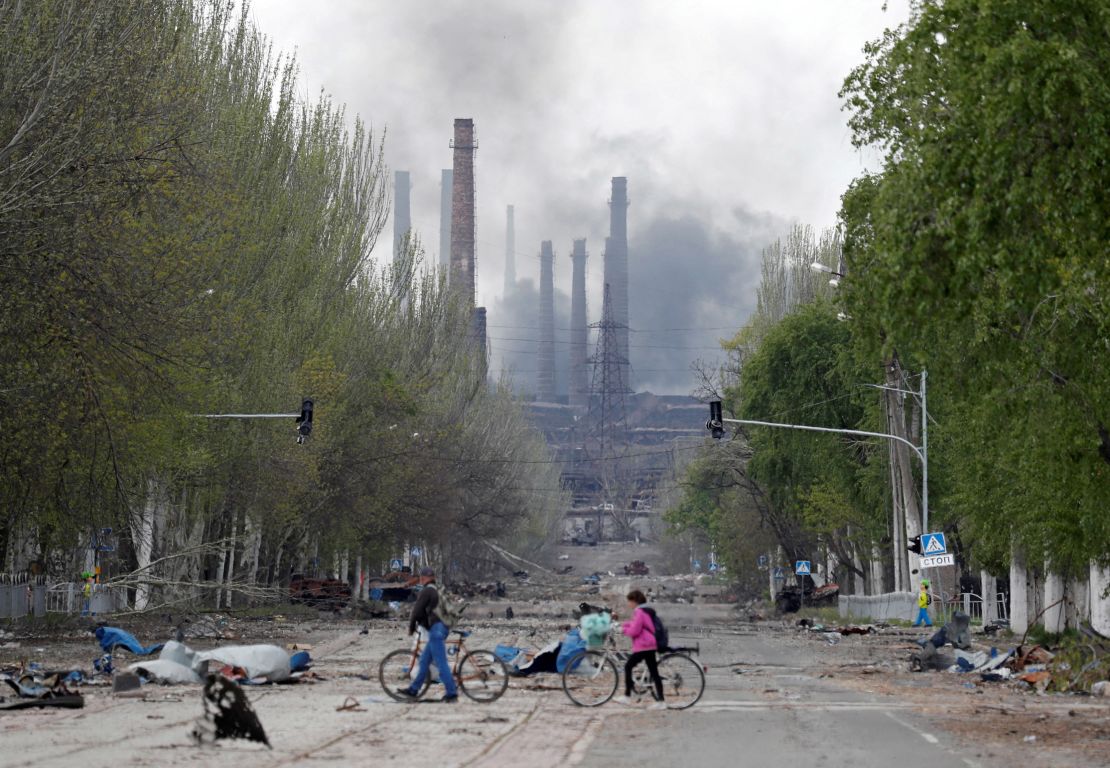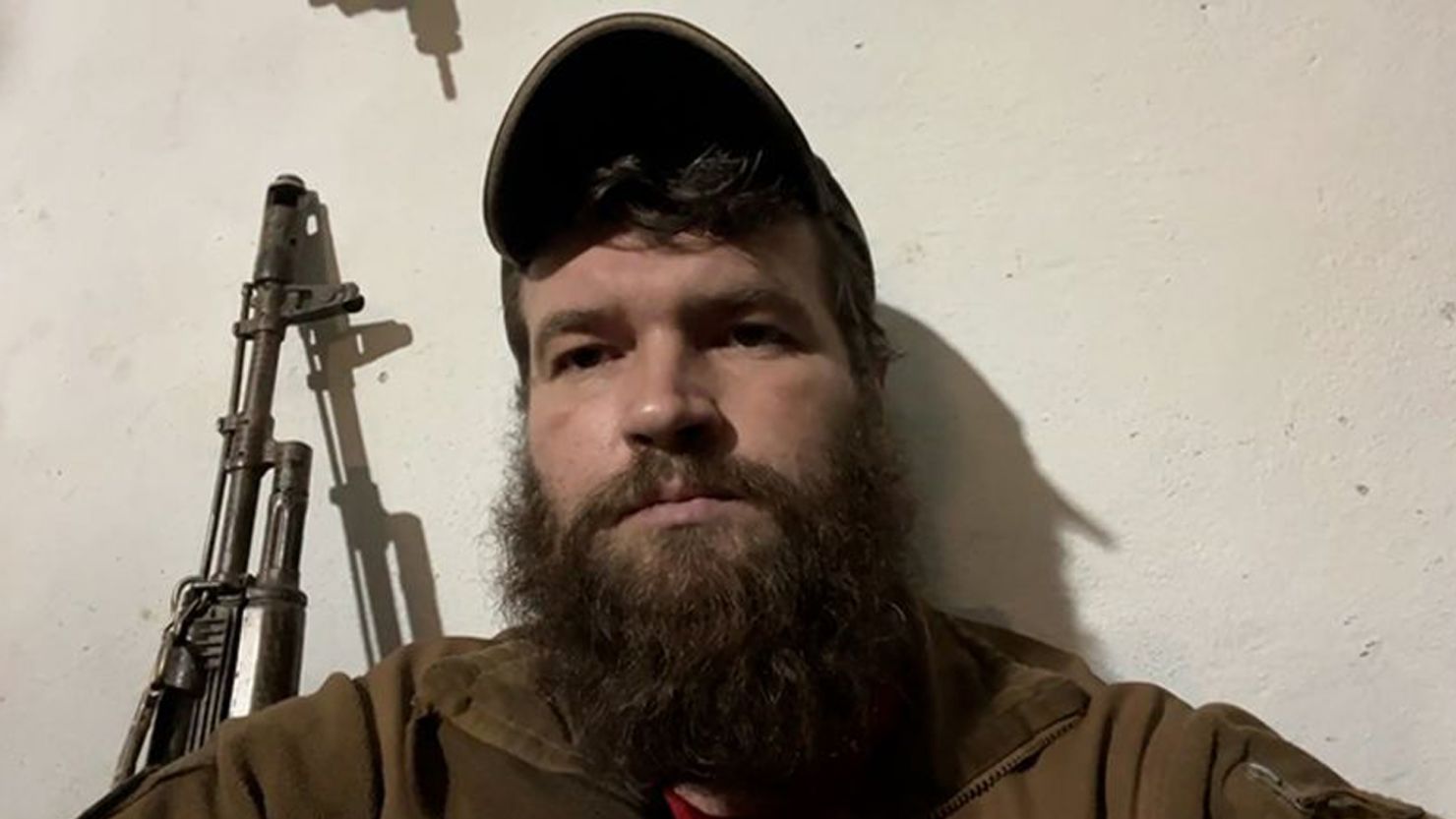As Russian forces close in on the Azovstal steel plant, the Ukrainian civilians and resistance fighters holed up in the last bastion of Mariupol are facing “nonstop” bombardment and running dangerously low on supplies – forcing some to consider desperate measures to survive.
Fighters inside the besieged plant are “sharing water and food” with civilians – but time is running out, the deputy commander of the Ukrainian Azov Regiment, Svyatoslav Palamar, told CNN on Monday evening.
“We are extremely short on supplies in terms of water and food. I cannot tell you for sure how much is left… but I can assure you that we are saving, very fearful without water and food, and especially ammunition,” Palamar, who is inside the plant, said.
“If (worse) comes to worst and we run out of food, we’ll be catching birds and we’ll be doing everything just to stand firm,” he added.
For weeks, the world has watched in horror as Russia continues its attack on the vast steel plant. The defiance of those who remain has become a symbol of the country’s unwavering resistance against an enemy that far outnumbers them.
But Russia says its forces have now reached the outskirts of the plant and are carrying out a “step by step clearing mission,” though Palamar says the Ukrainian defenses are holding, for now. His fighters have repelled multiple attacks and killed five Russian soldiers, he said.
On Sunday, about about 100 civilians were evacuated from the plant. But a further 100 are thought to remain, including 20 children, Palamar told Reuters on Monday. It is unclear how many fighters are still sheltering there.
Those evacuated Sunday emerged from the plant to rubble-strewn streets and unrecognizable neighborhoods in bombed-out Mariupol.
Images published by Reuters on Sunday show some women, children and elderly people emerging from buses to an area lined with white tents in the Russian-held town of Bezimenne – about 16 miles east of Mariupol – in a convoy of Russian tanks emblazoned with the letter Z and United Nations vehicles. Some cling to bags of their belongings. One holds a cat carrier. Soldiers in unmarked fatigues, carrying rifles, patrol the area.

One of the evacuees, a woman who was employed at the Azovstal steel plant, said she had spent weeks hiding out in the maze of Soviet-era bunkers below the facility. She said she had previously tried to escape Mariupol through an evacuation corridor but that relentless shelling had stopped her.
“I was afraid to even walk out and breathe some fresh air,” said the woman. “I can’t believe it. Two months of darkness.”
After the evacuation of those civilians, the steel plant came under fire again Sunday night, according to a Ukrainian soldier in Mariupol who spoke to Ukrainian television. A further planned evacuation for Monday did not take place.
Palamar said the plant was now under continuous air bombardment by Russian forces despite the remaining civilians.
“The strikes have been going on nonstop, it’s been tank artillery, volley artillery, and every three to five minutes there is air bombardment… the cynicism of all this is there is still civilians sheltering in the plant and yet the enemy continues this bombing,” Palamar said.
He said that “as of now, the entire plant territory is under our control and … we are holding the defense.”
But it remains unclear for how long he and the Azov Regiment can continue to do so.
Palamar said he and his fighters could have no confidence that if captured by the Russians, they would be treated respectfully as prisoners of war. He accused the Russians of war crimes, claiming there had been an incident in which they sent pictures of a tortured Ukrainian soldier to his mother.
“They’re not honoring those conventions and they are killing and torturing prisoners of war,” he said. “Just to add to that, unlike Russian soldiers, we are treating prisoners of war differently.”
Palamar also claimed the Ukrainians have Russian prisoners of war with them in the plant.
“In fact, we are sharing our provisions with them… we have an officer, a tank commander, and two other servicemen (who are being kept in) the same conditions as we are.”
CNN cannot independently verify Palamar’s claims.
A CNN investigation in April revealed that Russian forces and allied separatist soldiers were taking Mariupol residents to a so-called “filtration center” in Bezimenne, where they were registered before being sent on to Russia – many against their will. Ukrainian government and local Mariupol officials say that tens of thousands of Ukrainian citizens have been forcibly deported to Russian controlled areas since the war began.


